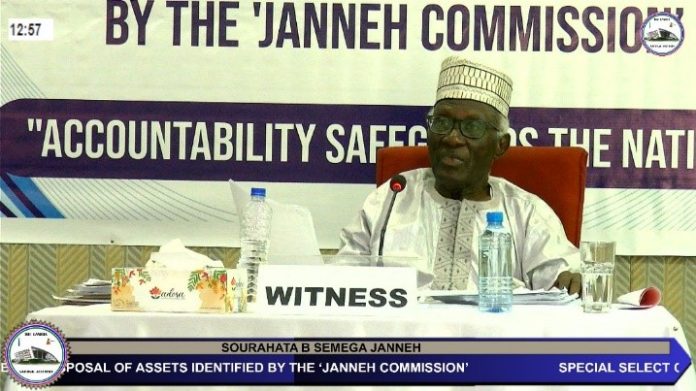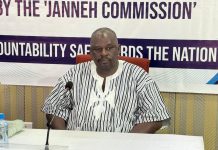By Kebba AF Touray
Sourahata B. Semega Janneh, former Chairperson of the Janneh Commission, defended the independence of the commission he once led, pushing back against any suggestion of government influence during its high-profile inquiry into the assets of former President Yahya Jammeh and his associates.
Appearing before the National Assembly’s Special Select Committee on Tuesday, Mr. Janneh offered testimony that placed institutional independence at the center of the commission’s work, even as he acknowledged operational challenges, lack of a dedicated legal framework, and dependence on government resources.
“I rejected it completely,” Janneh recalled, describing an instance when the Cabinet had written to the commission instructing it to take certain actions. “I told them they had no right to tell us they had decided. To the extent that if they had continued, I would have resigned.” The letter, he added, had been submitted to the committee as evidence.
This uncompromising stance formed the heart of his testimony before the committee, which is investigating how the government has handled the assets identified by the Janneh Commission. The Special Select Committee, led by Hon. Abdoulie Ceesay, is tasked with probing the disposal and sale of properties, companies, and other wealth linked to Jammeh and his associates following the release of the commission’s report.
Under questioning by Counsel Lamin A.M. Dibba, Mr. Janneh described the steps taken to insulate the commission from external interference. He said the commissioners had conducted an internal orientation at their offices in Djembe Hotel, where they collectively determined the procedural direction of the inquiry, especially in the absence of a draft guiding document. “We mapped out how we were going to deal with the proceedings,” he said. “It was made clear to all that we have to be neutral, impartial and honest, and we had to be transparent.”
Pressed on whether the commission received any direct interference from the Attorney General during its operations, Mr. Janneh responded, “I have not been contacted by the former Attorney General, while we were dealing with matters.”
Still, the commission’s relationship with government ministries and the extent of executive involvement emerged as recurring themes. Mr. Janneh disclosed that the Ministry of Justice was involved in budget discussions at the outset. “The draft of the first budget came from the Ministry of Justice, and we sat in the Minister’s office for discussion,” he said. The commission, he noted, was given three months to deliver its report.
Despite the commission’s reliance on government support and lack of a stand-alone statute, Janneh emphasized that its legal authority stemmed directly from the 1997 Constitution. He denied any excessive personal power, stating that decisions were taken collectively among the commissioners. “When disagreements arose, the team discussed them and came to an agreement together,” he testified.
Mr. Janneh was also asked whether the commission had collaborated with government agencies responsible for monitoring frozen assets, such as the Livestock Marketing Agency. He replied that he could not remember any specific interactions with such institutions. Similarly, when asked if he was aware of a May 2017 lawsuit brought by the former Attorney General seeking to preserve assets linked to financial mismanagement, Janneh responded, “I cannot remember that suit,” although he later acknowledged seeing a freezing order.
On the composition of the commission’s staff, Mr. Janneh said he could not confirm whether public servants continued to be paid by the commission during their secondment. However, he confirmed that several interpreters and clerks were from the judiciary. “In fact, I can confirm that a lot of the interpreters, court clerks—most of them were officials from the judiciary,” he stated.
Mr. Janneh also clarified the chain of command and reporting lines within the commission. He said the Lead Counsel handled a range of legal matters, including representing the commission in high court and appeal court cases. He was asked to clarify a document marked SBS1, in which the term “security” was used. Janneh explained that the term should have read “investigators,” and noted that these individuals worked under the Lead Counsel on security-related matters.
Further clarifying the internal structure of the commission, Mr. Janneh said the Secretary of the commission—appointed by the President—served as the custodian of all commission documents. He was unable to confirm whether the President had signed the legal notice establishing the commission.
Janneh also sought to distinguish the Janneh Commission from other accountability mechanisms, particularly the Truth, Reconciliation and Reparations Commission (TRRC). He noted that unlike the TRRC, the Janneh Commission had no specific law establishing it and lacked a dedicated budget. “We relied entirely on government funds,” he said.
As the hearing concluded, Mr. Janneh reiterated that his primary responsibility as Chair was to guide discussions and not to wield unilateral authority. He also confirmed that the idea for his appointment came from former Attorney General Ba Tambedou.
While his appearance aimed to clarify the legal foundation, structure, and processes of the Janneh Commission, Janneh’s core message remained consistent throughout: that the integrity of a commission lies in its ability to act independently, regardless of the political environment or the source of its funding.
For members of the committee, Janneh’s testimony will likely serve as a key reference point as they examine whether the recommendations and asset recovery efforts flowing from the commission were handled in the same spirit of independence with which they were conceived.



















